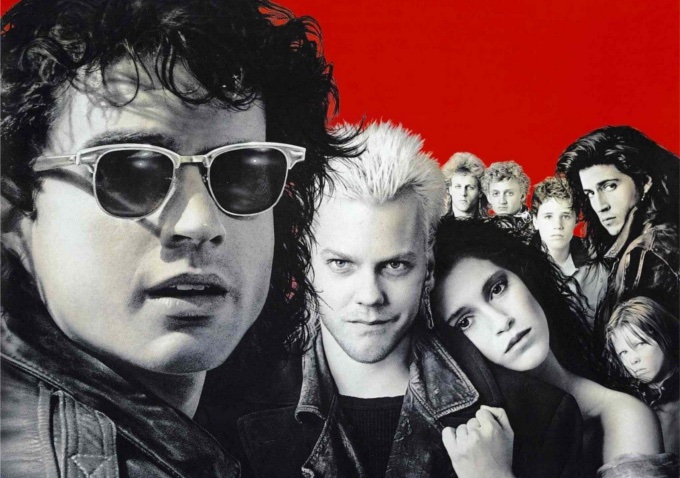Vampires, since their inception, have always been queercoded at minimum. Carmilla clearly, at least for 1876, centers on a U-Haul lesbian situationship gone wrong and several analyses of Dracula posit Bram Stoker used the titular count as a vessel for societal ills including homosexuality. So what exactly makes The Lost Boys such a long-standing classic queer horror classic? Despite the film largely sidestepping the romantic or gothic trappings of traditional vampire narratives, Joel Schumacher seamlessly implemented elements of 80s gay culture into the film from the vampires’ looks to their mannerisms. By creating a cast of young, rebellious, unambiguously queercoded vampires (and vampire hunters…to an extent), The Lost Boys essentially cemented itself in the queer horror canon.
Perhaps the largest and most obvious gap between The Lost Boys and its vampire film contemporaries comes from its visuals–particularly the setting and the appearance of the titular crew of vampires. David (Kiefer Sutherland) and his undead crew are vampires for the working class. In lieu of a bourgeois castle and extensive countryside hunting grounds, they prowl on the night crowds of Santa Carla’s boardwalk carnival and live in a desecrated hotel stuck in a cliffside. Peasant blouses and tailored trousers get replaced by tattered jeans, leather jackets, and motorcycle boots. Although linking David and crew’s look to the then-modern punk counterculture of the 1980s wouldn’t be entirely incorrect, another countercultural movement of the decade also notable for its copious leather usage.

It’s not hard to extrapolate that the main quartet of vampires in The Lost Boys take some cues from gay culture, especially queer kink culture. Any of the four could feasibly be in the background of William Friedkin’s Cruising or depicted in a Tom of Finland comic with no questions asked. Vampirism’s roots in sexual deviancy, see Stoker’s hypothesized intended use of the vampire mentioned earlier, lends itself well to a blend with the more hardcore sides of gay sex. Making the crew’s hunting grounds a very public boardwalk also lends itself to cruising parallels. Vampires tend to take quite a seductive approach to luring their prey, David and his crew are no different, however the more posh brand of vampires tend to keep their seductions a bit more private. While the crew do keep their most subversive acts (murder) to the more private dominion of their cliffside home, the specific mannerisms and dialogue the vamps use to pick up Michael (Jason Patric) and lure him to join the gang certainly has the air of casually searching for a hook-up.
Looks aren’t everything though; The Lost Boys continues to endear itself to queer audiences through its themes as well. First is the idea of a found family: a desire that runs through all the principal cast, especially the Emerson brothers Michael and Sam (Corey Haim). What initially splits the brothers apart is their craving for a new community after a sudden move. Michael thinks he finds it with David (or, more realistically, with Star) while Sam quickly finds a spot with the eccentric Frog brothers. I joked earlier about the Lost Boys being in a polycule but they, plus Star (Jaime Gertz) and Laddie (Chance Michael Corbitt), functionally take care of each other and have a family dynamic. Although said dynamic is quite dysfunctional it’s easy to see why Michael became so involved with the crew so quickly.
Between the working-class/kink-adjacent look and feel of the titular vampire crew and its main themes, The Lost Boys more than earns its spot as a queer horror classic. The dysfunctional vampire polycule of David, Dwayne, Marko, and Paul mirror the more subversive parts of 80s gay culture. The added twist of the queercoding staple–vampirism–simply seals The Lost Boys as one of the staples of queer horror.
Rating:

Red Broadwell is a first-year film studies MA student at the University of North Carolina Wilmington. Their other work can be found at https://redbroadwell.journoportfolio.com
–
Thanks for reading! Interested in being featured as a guest blogger? Pitch us your review or think piece on queer horror!
Stay spooky!
💀🏳️🌈🔪
